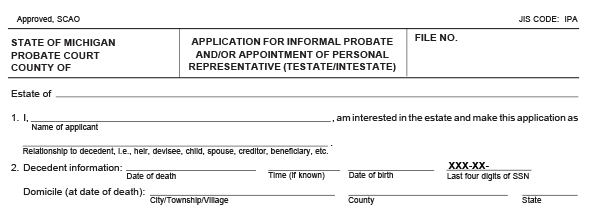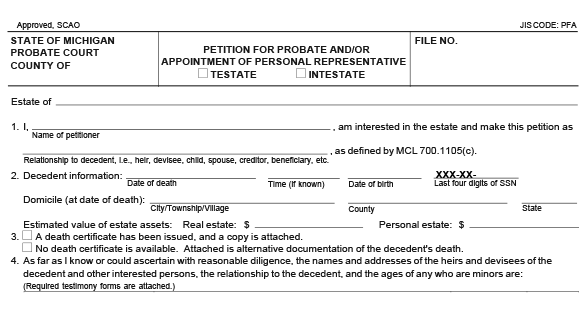Probate For Real Estate Property in Michigan
When someone is interested in purchasing or selling real estate, there is sometimes a question regarding who rightfully holds the title or deed to the property. This comes about usually due to a person passing away without a proper will or failing to deed a property to their heirs before passing. Without a proper will or deed from the decedent, a home cannot be legally sold, refinanced or owned by any person other than the decedent’s estate.
In Michigan, when this situation happens the property will be forced to go through probate in order to determine the rightful beneficiaries and ownership of the property. Generally speaking, there are two different avenues in which a property will be probated. These are referred to as Informal Administration and Formal Administration. Which one is used will depend on the circumstances surrounding the property in question.
Informal Administration
Also referred to as informal unsupervised administration, this is the simplest option for probating real estate. This can be used whether a decedent passed away with a will, or if all individuals who have an equal right to appointment as a personal representative are in agreement as to who should be appointed as the personal representative of the estate.
This process is started by filing an “Application for Informal Probate and/or Appointment of Personal Representative” with the probate court where the decedent resided. If there is a will this must be filed at the same time, as well as a copy of the decedent’s death certificate. The purpose of this process is for the Probate Register to admit a will to probate and/or appoint a personal representative for the estate.

Once an application has been granted by the court, the Probate Register will sign a >Register’s Statement Form, admitting the decedent’s will and/or appointing a personal representative for the estate. It should be noted that because this appointment can be contested at any point during the process, it is strongly advised to have any person(s) with equal right to appointment as Personal Representative renounce their right to do so in order to prevent complications. After the representative files an Acceptance of Appointment and any required bond, they will then be able to proceed with the unsupervised administration of the estate until it is closed.
Formal Administration
Formal administration is used in situations where the decedent passes away without a formal will and/or those persons with equal right to appointment cannot be found. This requires an interested party to petition the court for a formal probate proceeding, known as the “Petition for Probate and/or Appointment of Personal Representative”. Once this has commenced, all interested persons will be properly notified of the proceedings and a court hearing will then take place.

As long as the petition is not contested and/or the judge decides to continue proceedings over any objections, the judge will then enter an “Order of Formal Proceedings”, which does several things. It may admit a will, determine rightful heirs of the decedent and will appoint a Personal Representative to administer the estate. Just as in an Informal Administration, this representative must file an Acceptance of Appointment and any bond required. The Personal Representative will then carry out the unsupervised administration of the estate until it is ready to be closed.
Attorney For Probate Real Estate
Sean J Nichols PLLC is a law firm for estate planning and probate that’s dedicated to helping families plan a comfortable future. This planning may involve drafting a will, setting up a trust, providing care for children/relatives and more. As a law firm that’s experienced in these areas, we handle many issues involving the probate of real estate property.
If you or someone you know needs help with administering real estate through the probate court system, give us a call and arrange a confidential consultation with an attorney today.
